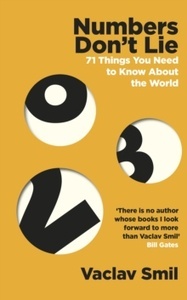Numbers Don't Lie

Editorial Penguin Books Ltd
Fecha de edición octubre 2020 · Edición nº 1
Idioma español
EAN 9780241454411
384 páginas
Libro
encuadernado en tapa dura
Dimensiones 144 mm x 222 mm
Resumen del libro
'There is no author whose books I look forward to more than Vaclav Smil' Bill GatesIs flying dangerous? How much do the world's cows weigh? And what makes people happy?From earth's nations and inhabitants, through the fuels and foods that energize them, to the transportation and inventions of our modern world - and how all of this affects the planet itself - in Numbers Don't Lie, Professor Vaclav Smil takes us on a fact-finding adventure, using surprising statistics and illuminating graphs to challenge lazy thinking. Packed with 'Well-I-never-knew-that' information and with fascinating and unusual examples throughout, we find out how many people it took to build the Great Pyramid, that vaccination yields the best return on investment, and why electric cars aren't as great as we think (yet). There's a wonderful mix of science, history and wit, all in bite-sized chapters on a broad range of topics.
Urgent and essential, Numbers Don't Lie inspires readers to interrogate what they take to be true in these significant times. Smil is on a mission to make facts matter, because after all, numbers may not lie, but which truth do they convey?'Smil's title says it all: to understand the world, you need to follow the trendlines, not the headlines. This is a compelling, fascinating, and most important, realistic portrait of the world and where it's going' Steven Pinker'The best book to read to better understand our world.
Once in a while a book comes along that helps us see our planet more clearly. By showing us numbers about science, health, green technology and more, Smil's book does just that. It should be on every bookshelf!' Linda Yueh, author of The Great Economists'He is rigorously numeric, using data to illuminate every topic he writes about.
The word "polymath" was invented to describe people like him' Bill Gates'Important' Mark Zuckerberg, on Energy'One of the world's foremost thinkers on development history and a master of statistical analysis . . .
The nerd's nerd' Guardian'There is perhaps no other academic who paints pictures with numbers like Smil' Guardian'In a world of specialized intellectuals, Smil is an ambitious and astonishing polymath who swings for fences . . .
They're among the most data-heavy books you'll find, with a remarkable way of framing basic facts' Wired'He's a slayer of bullshit' David Keith, Gordon McKay Professor of Applied Physics x{0026} Professor of Public Policy, Harvard UniversityVaclav Smil is Distinguished Professor Emeritus at the University of Manitoba. He is the author of over forty books on topics including energy, environmental and population change, food production and nutrition, technical innovation, risk assessment and public policy. No other living scientist has had more books (on a wide variety of topics) reviewed in Nature.
A Fellow of the Royal Society of Canada, in 2010 he was named by Foreign Policy as one of the Top 100 Global Thinkers. This is his first book for a more general readership.
Biografía del autor
Vaclav Smil (Pilsen, 1943) es un científico checo-canadiense reconocido a nivel mundial por sus aportes en los campos de la energía, el medio ambiente, la demografía y las políticas públicas. Profesor emérito de la Universidad de Manitoba, ha publicado más de 500 artículos científicos y 60 libros, entre los que destacan ¿Cómo funciona el mundo? (2023) y Energía y civilización. Una historia (2021). La revista Foreign Policy lo ha incluido entre los 100 pensadores más influyentes del mundo, y en 2013 fue condecorado con la Orden de Canadá, entre muchos otros premios y distinciones. Ha impartido cientos de conferencias y ha trabajado como consultor para instituciones estadounidenses, europeas e internacionales. En la actualidad lleva una vida sencilla: cultiva parte de sus propios alimentos, lee alrededor de cien libros no técnicos al año y se niega a tener un teléfono móvil para dedicarse por completo a la investigación y la escritura.








